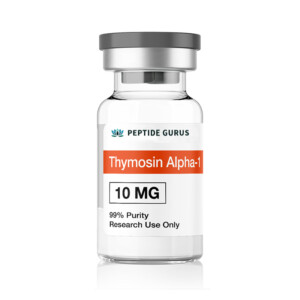Thymosin Alpha-1 (TA-1), a synthetic peptide derived from the thymus gland, has emerged as a promising therapeutic agent in hepatitis treatment due to its immune-modulating properties. This article explores TA-1’s role in managing viral hepatitis, its mechanism of action, clinical evidence, and how it aligns with FDA guidelines, particularly for products like
Thymalin 20mg (available
here).
Thymosin Alpha-1 works by enhancing the immune system’s ability to combat infections. Specifically, it stimulates the production and activity of T-cells, natural killer (NK) cells, and dendritic cells, which are critical for targeting virus-infected liver cells . By upregulating cytokines like interferon-gamma (IFN-γ) and interleukin-12 (IL-12), TA-1 strengthens the antiviral response while reducing inflammation . This dual action makes it a valuable adjunct therapy for chronic hepatitis B (CHB) and C (CHC), where immune dysfunction is a key challenge.
TA-1 has been studied extensively in CHB. A randomized controlled trial found that combining TA-1 with lamivudine significantly improved virological response rates, HBeAg seroconversion, and liver function normalization compared to lamivudine alone . Another Phase III study reported sustained HBV DNA suppression in 25% of TA-1-treated patients, highlighting its potential to induce long-term remission .
For CHC, TA-1 shows promise when combined with interferon and ribavirin. A trial demonstrated that adding TA-1 to standard therapy increased HCV RNA clearance rates and histological improvement in non-responders to prior interferon-based treatments . This suggests TA-1 may overcome treatment resistance by reinvigorating the immune response.
The FDA’s stance on TA-1 has evolved. While TA-1 (marketed as Zadaxin) was previously granted orphan drug status for CHB and hepatocellular carcinoma, recent regulatory changes in 2024 reclassified it as a Category 2 bulk drug substance, restricting its compounding for human use in the U.S. . However, TA-1 remains approved in over 30 countries for hepatitis and cancer indications . Products like Thymalin 20mg, which contain TA-1, are currently available for research purposes but require medical supervision for therapeutic use .
Thymalin 20mg offers a stable, high-purity formulation of TA-1. Its subcutaneous administration aligns with clinical guidelines for hepatitis treatment, where doses of 1.6 mg twice weekly are standard . The product’s formulation ensures bioavailability and safety, with minimal side effects like mild injection-site irritation .
-
Is Thymalin 20mg FDA-approved?
Thymalin is not FDA-approved for human use but is authorized for research. Its active ingredient, TA-1, has a history of FDA orphan drug designation for specific liver conditions .
-
Can Thymalin be used alongside antiviral medications?
Yes. Clinical trials support TA-1’s use with interferon, ribavirin, and nucleoside analogs to enhance efficacy . Always consult a healthcare provider to avoid interactions.
-
What are the side effects?
Most users experience mild injection-site reactions. Rare cases report fatigue or flu-like symptoms, which resolve without intervention .
Thymosin Alpha-1 represents a significant advancement in hepatitis therapy, particularly as an adjunct to antiviral regimens. While FDA regulations currently limit its availability in the U.S., its immune-modulating properties and positive clinical outcomes underscore its potential. Products like Thymalin 20mg provide a reliable source of TA-1 for research and supervised therapeutic use. Always prioritize professional medical guidance to ensure safe and effective treatment.
